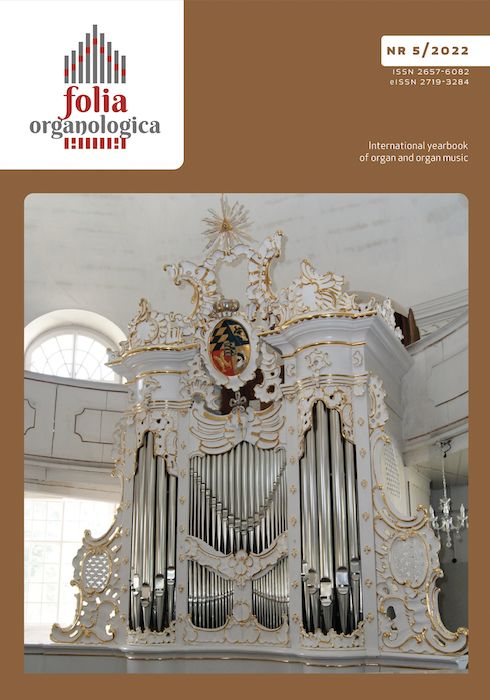Pražská varhanická škola
The Prague Organ School
Author(s): Jan HoraSubject(s): History, Fine Arts / Performing Arts, Cultural history, Music, History of Art
Published by: Uniwersytet Opolski
Keywords: organs; compositions; Prague school
Summary/Abstract: The first music school in Prague was the Conservatory, which was founded in 1811. However,teaching was limited to orchestral instruments and singing. Therefore, a group of musicenthusiasts decided to establish an organ school in 1830 to help improve the then poor standardof church music. It educated future organists and church choirmasters as well as future musicteachers. It pursued three aims – thorough teaching of music-theoretical subjects, education forfuture teaching and instrumental – organ teaching, at the beginning for liturgical purposes only.Only later was the subject of organ playing introduced. In music theory, harmony, general bass,counterpoint and modulation were taught. Theoretical knowledge was put to practical use inimprovisation. Right from the beginning it was compulsory to compose at least three preludesfor the final examinations, six for the more gifted, and the graduates had to play their compositionalattempts themselves as part of the examination. This thorough theoretical teaching attractedthose interested in compositional disciplines from the very beginning of the school, and itcan be stated that almost all the major Czech composers of the 19th century, with the exceptionof Bedřich Smetana and Zdeněk Fibich, studied at the Prague Organ School. Among the mostfamous graduates is Antonín Dvořák, who wrote 5 preludes and 3 fugues for his final exams in1859. Leoš Janáček composed the Overture, the Varyto and the Choral Fantasy and performedthe third of these pieces himself in 1875. Janáček later founded a similar organ school in Brno,which was of fundamental importance for the development of music arts in Moravia.The school prospered admirably, although it was financed only from private sources until the1860s. In the beginning, the studies lasted only one year, but from 1833–1871 they were extendedto two years. In the early days, the school was run by Jan Augustin Vitásek (1770–1839)in the spirit of late classicism, but with the arrival of Karl Franz Pitsch (1786–1858) as teacherfrom 1839 and institute director from 1842, the school gained a very internationally orientedmusician who was a member of the Dutch Musical Society, the Salzburg Mozarteum and was incorrespondence with Felix Mendelssohn-Bartholdy. Pitsch was a lover and admirer of JohannSebastian Bach and advocated the compulsory study of his organ works. Because church organsat that time mostly had a “short octave” in the pedal with insufficient range for Bach’s organcompositions, he managed the building of a two-manual organ with a full chromatic pedal forthe school in 1853, on which all the final examinations were taught and held.After a short interregnum, another internationally oriented director, František Zdeněk Skuherský(1830–1892), took over in 1866. He continuously studied church music reform in Regensburg,Gregorian chant in Rome and organ building in Paris. After his accession he proposedto extend his studies to three years with the third year as strictly elective. It was the first masterschool of its kind in Prague. The fame of the Prague Organ School was so great that it attractedstudents from all over the Austro-Hungarian monarchy and from near abroad. Under pressurefrom the Austrian Ministry of Culture and Education, which recommended the fusion of theOrgan School with the Prague Conservatory for financial reasons, the two schools were mergedin 1890. The curriculum and pedagogical methods of the organ school were so well developedthat they were adopted without change by the conservatoire, to which the best teachers of theorgan school also transferred. This state of affairs lasted until the establishment of the CzechoslovakRepublic in 1919, when the organ, composition and conducting departments became independent.In his contribution, the author presents many hitherto unknown data on the teachingmethods and on the evaluation of students.
Journal: Folia Organologica. International yearbook of organ and organ music
- Issue Year: 2022
- Issue No: 5
- Page Range: 96-107
- Page Count: 12
- Language: Czech, Polish

